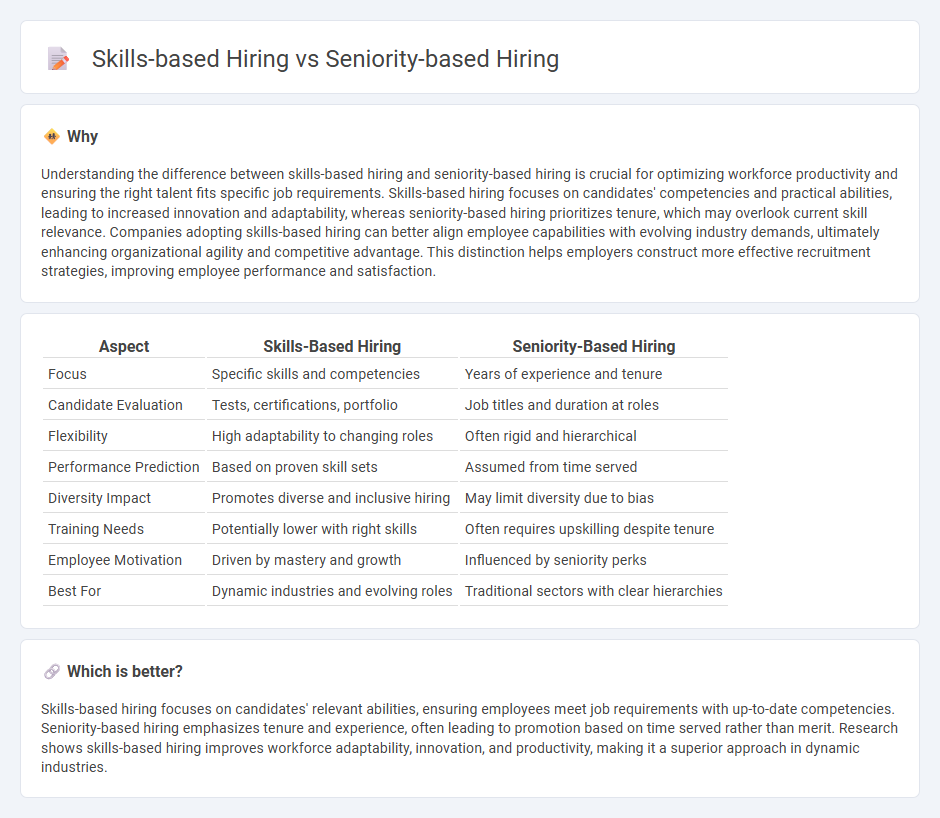
Skills-based hiring emphasizes a candidate's competencies, technical expertise, and relevant experience over years spent in previous roles, promoting a more meritocratic and adaptable workforce. Seniority-based hiring relies on tenure and hierarchical progression, often valuing longevity within an industry or company as a primary qualification. Explore how these contrasting approaches impact organizational performance and talent acquisition strategies.
Why it is important
Understanding the difference between skills-based hiring and seniority-based hiring is crucial for optimizing workforce productivity and ensuring the right talent fits specific job requirements. Skills-based hiring focuses on candidates' competencies and practical abilities, leading to increased innovation and adaptability, whereas seniority-based hiring prioritizes tenure, which may overlook current skill relevance. Companies adopting skills-based hiring can better align employee capabilities with evolving industry demands, ultimately enhancing organizational agility and competitive advantage. This distinction helps employers construct more effective recruitment strategies, improving employee performance and satisfaction.
Comparison Table
| Aspect | Skills-Based Hiring | Seniority-Based Hiring |
|---|---|---|
| Focus | Specific skills and competencies | Years of experience and tenure |
| Candidate Evaluation | Tests, certifications, portfolio | Job titles and duration at roles |
| Flexibility | High adaptability to changing roles | Often rigid and hierarchical |
| Performance Prediction | Based on proven skill sets | Assumed from time served |
| Diversity Impact | Promotes diverse and inclusive hiring | May limit diversity due to bias |
| Training Needs | Potentially lower with right skills | Often requires upskilling despite tenure |
| Employee Motivation | Driven by mastery and growth | Influenced by seniority perks |
| Best For | Dynamic industries and evolving roles | Traditional sectors with clear hierarchies |
Which is better?
Skills-based hiring focuses on candidates' relevant abilities, ensuring employees meet job requirements with up-to-date competencies. Seniority-based hiring emphasizes tenure and experience, often leading to promotion based on time served rather than merit. Research shows skills-based hiring improves workforce adaptability, innovation, and productivity, making it a superior approach in dynamic industries.
Connection
Skills-based hiring and seniority-based hiring intersect by evaluating candidates through different lenses: skills focus on current competencies while seniority emphasizes tenure and experience within a company. Integrating both approaches can create a balanced workforce by valuing demonstrated expertise alongside institutional knowledge. Data shows companies combining these methods often achieve higher employee retention and improved role performance.
Key Terms
Tenure
Seniority-based hiring emphasizes candidates' tenure and years of experience within an industry or company, often valuing loyalty and long-term commitment. Skills-based hiring prioritizes demonstrated competencies and relevant expertise regardless of the candidate's length of service, aiming to align talents directly with job requirements. Discover how shifting the focus from tenure to skills can enhance workforce agility and innovation.
Competency
Seniority-based hiring prioritizes years of experience and tenure, often overlooking actual competency levels crucial for job performance. Skills-based hiring emphasizes specific abilities and competencies, aligning candidates' expertise directly with job requirements to enhance productivity and innovation. Explore more about how competency-focused hiring can transform your recruitment strategy.
Merit
Skills-based hiring prioritizes candidates' competencies and demonstrated abilities, ensuring the best fit for the job regardless of years of experience. Seniority-based hiring often emphasizes tenure and organizational loyalty, which may overlook critical skills required for current roles. Explore more to understand how merit-driven approaches can transform talent acquisition strategies.
Source and External Links
Hiring Practices and the Seniority System - craresources - Seniority-based hiring privileges employees with the longest tenure, fostering company loyalty, job security, and employee satisfaction, though it does not necessarily correlate with competence or qualifications.
Seniority Basics | UE - Seniority is based on length of service from the hire date and governs decisions in layoffs, rehiring, and promotions, often tempered by the requirement that employees can reasonably learn the job, balancing fairness with employer concerns.
The Ultimate Guide to Seniority - Number Analytics - Seniority affects promotions, transfers, layoffs, benefits, and workplace culture by providing predictability and job security but can also lead to complacency and tension between senior and junior employees.
 dowidth.com
dowidth.com